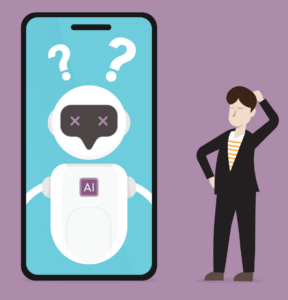 It’s ok to admit that artificial intelligence (AI) is intriguing. Maybe you’ve even tested it out by asking an AI assistant, like Chat GPT, to do a seemingly impossible task and within minutes, seconds even, you have a result or the answer to your question. AI may be gaining traction and can certainly be entertaining, but it’s not a resource to be trusted with your good health or financial security. We have a health plan that affords you and your family access to a vast network of medical professionals and all of our EWTF members have access to the financial professionals of Fidelity for questions about investing and saving for retirement.
It’s ok to admit that artificial intelligence (AI) is intriguing. Maybe you’ve even tested it out by asking an AI assistant, like Chat GPT, to do a seemingly impossible task and within minutes, seconds even, you have a result or the answer to your question. AI may be gaining traction and can certainly be entertaining, but it’s not a resource to be trusted with your good health or financial security. We have a health plan that affords you and your family access to a vast network of medical professionals and all of our EWTF members have access to the financial professionals of Fidelity for questions about investing and saving for retirement.
When AI first hit the scene, many students were turning to AI assistant programs to “help” complete their homework and these programs churned out essay after essay with the click of a button in a matter of minutes. High schools and colleges have caught on to the use of AI now and employ AI detectors to determine if the work is actually that of a “human” student or AI generated.
The use of AI is not merely limited to homework and final essays, though. People have been turning to AI assistants to answer medical questions or seek investment advice, bypassing medical professionals and investment professionals altogether. This can be very risky. AI generates results by scouring the Internet and we humans know that you can’t believe everything you read online. AI does not know this. Furthermore, AI results don’t always note the resources used to generate results so users are taking AI results with no proof that what they are receiving is fact. Going on blind faith could put your health at risk or lead you into an ill-advised investment if you rely on AI.
What’s more, AI can generate completely different responses based on how you phrase a question or task. Two people could be seeking the same answer but if they phrase their questions just slightly different, they could get wildly different answers. Again, getting different answers to an important medical question could be dangerous.
Get your answers from a proven “human” professional by finding a medical provider in UMR’s network of professionals by visiting www.umr.com.
Speak to a live Fidelity advisor Monday through Friday 8 am-midnight by calling 866-84-UNION or stopping in to any brick-and-mortar Fidelity office. Resourcesare also available at www.fidelity.com.

